Sport Club do Recife
Sport Club do Recife, (Portuguese pronunciation: [ˈspɔɾti ˈklub du ʁeˈsifi]; known as Sport Recife or Sport, is a Brazilian sports club, located in the city of Recife, in the Brazilian state of Pernambuco. It was founded on May 13, 1905, by Guilherme de Aquino Fonseca, who lived for many years in England, where he studied at Cambridge University.
 | ||||
| Full name | Sport Club do Recife | |||
|---|---|---|---|---|
| Nickname(s) | Leão (Lion), O Leão da Ilha (The Lion of the Island), | |||
| Founded | May 13, 1905 as Sport Club do Recife | |||
| Ground | Ilha do Retiro | |||
| Capacity | 35,000 | |||
| President | Milton Bivar | |||
| Head coach | Jair Ventura | |||
| League | Campeonato Brasileiro Série A Campeonato Pernambucano | |||
| 2019 2020 | Série B, 2nd (promoted) Pernambucano, 7th | |||
| Website | Club website | |||
|
| ||||

In football, the club has won six CBD/CBF titles, including three national and three regional. Its greatest achievements are the Campeonato Brasileiro Série A 1987 and 2008 Brazil Cup. In addition to professional football, the club also participates in women's football and Olympic sports, such as rowing, swimming, hockey, basketball, futsal, volleyball, table tennis, taekwondo, judo and athletics.
It has a historic rivalry with Santa Cruz, where matches between the two are known as the Clássico das Multidões. The derby against Náutico is called the Clássico dos Clássicos, while the derby with América-PE is called the Clássico dos Campeões.
History
Foundation and early years
Sport Club do Recife was founded in May 1905 by Guilherme de Aquino Fonseca, a member of a wealthy family in Pernambuco who found a love for football while studying engineering at the University of Cambridge. The club were the first recorded football club in the state of Pernambuco. Sport played their first match in 1905, drawing 2-2 against a team called English Eleven, a team formed by employees working for English companies in Recife.
The Campeonato Pernambucano was established in 1916, and Sport won the competition's first two titles.

Second republic and military government years
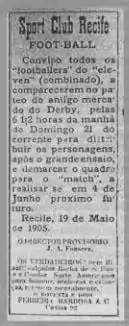
Sport Recife celebrated their 50th anniversary in 1955 by winning their 15th state title.
As a result of a dispute with the Federação Pernambucana de Futebol (FPF), Sport did not participate in the 1978 Campeonato Pernambucano.
National champions
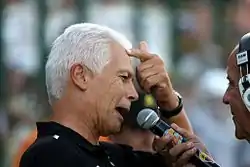
The 1987 Campeonato Brasileiro Série A resulted in Sport's first national title. After topping group B in both the 1st and 2nd rounds Sport beat Bangu 5-4 on aggregate in the semi-final, and then Guarani 3-2 in the final. They qualified for the 1988 Copa Libertadores, but failed to qualify for the next stages of the competition, finishing in 15th place overall.
Sport Club do Recife won the 1990 Série B. They drew 1-1 on aggregate with Atlético Paranaense in the final, but were awarded the title due to their better record across the season. Led by Givanildo Oliveira, Sport won the 1st Copa do Nordeste, beating hosts CRB-AL on penalties after a draw in normal time by 0–0.
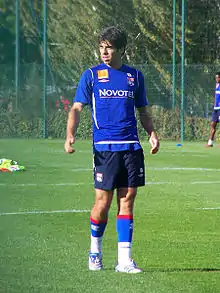
21st century
In 2000, Sport won the Copa do Nordeste for the 2nd time, this time under the command of coach Celso Roth after a 2–2 draw against Vitória, again winning the title due to a superior record.
In 2006, after five years in Série B (the Brazilian second division), Sport Club do Recife finished second. Sport had the same number of points as state rivals Náutico, but a better goal difference, and were promoted to Série A.
Sport became the first club from Northeastern Brazil to win the Copa do Bras, beating Corinthians on away goals in the 2008 final. Sport contested its second Copa Libertadores, finishing top of a group containing LDU, Colo-Colo and Palmeiras. They were drawn against Palmeiras in the next round, but were defeated on penalties, after drawing 1-1 on aggregate. In the second half of 2009, Sport disputed the Brasileirão, but could not repeat the excellent 1st half, finishing the race in last place, being demoted to Série B.
After a poor first half, O Leão da Ilha returned to Série A in 2011. Over the season the club had three different managers - Helio dos Anjos, Mazola Júnior, and PC Gusmão. Sport inherited a spot in the 2013 Copa Sudamericana by regulation of CBF towards the remnants of the Copa do Brasil. As the club had not planned to dispute it, it was not too far in its 1st participation. Leão were eliminated by Libertad of Paraguay with two losses in the 2nd phase, after eliminating Náutico. The only success of Leão this season was the return to Serie A in 2014 and the approval of the Sport's Arena project.
In 2014 Sport won their third Copa do Nordeste, 40th Campeonato Pernambucano, and campaigned in the Brasileirão, finishing in 11th place and ensuring a place in the Copa Sudamericana.
Current squad
First team
- As of 20 November 2020
Note: Flags indicate national team as defined under FIFA eligibility rules. Players may hold more than one non-FIFA nationality.
|
|
Reserve team
Note: Flags indicate national team as defined under FIFA eligibility rules. Players may hold more than one non-FIFA nationality.
|
|
Out on loan
Note: Flags indicate national team as defined under FIFA eligibility rules. Players may hold more than one non-FIFA nationality.
|
|
Technical staff
Current technical staff
|
Top scorers

| Position | Athlete | Goals |
| 1º | Traçaia | 202 |
|---|---|---|
| 2º | Djalma Freitas | 161 |
| 3º | Leonardo | 133 |
| 4º | Luís Carlos | 108 |
| 5º | Naninho | 105 |
| 6º | Dario (Dadá Maravilha) | 94 |
| 7º | Marcílio de Aguiar | 93 |
| 8º | Raúl Bentancor | 91 |
| 9º | Roberto Coração de Leão | 89 |
| 10º | Bé | 80 |
Supporters
The supporters of Sport are called Crimson-black, Leonine and Sportista. The club has various organized supporters:
|
|
|
Brazilian fans of Sport Recife
| State | Percentage |
| Pernambuco | 41% |
| Alagoas | 8% |
| Paraíba | 11% |
| Rio Grande do Norte | 5% |
| Sergipe | 6% |
- Total: 1.7% or 3.300.000 Supporters. Population Brazil (2010): 192.924.506 hab.
Rivalries
Santa Cruz
The Derby of Crowds (Clássico das Multidões) is a duel that often leads many people to Pernambuco. Sport has a considerable advantage in relation to its archrival, with a number exceeding 60 wins difference. It is the second largest difference in classic triumphs of Brazilian football.
Náutico
The Derby of Derbies (Clássico dos Clássicos) is the third oldest derby in the country, second only to Clássico Vovô and Grenal. This brings together the two oldest teams in Pernambuco, with Sport also having a big difference of advantages over its archrival: more than 20 wins.[2]
América-PE
The Champions Derby (Clássico dos Campeões) is one of the most ancient and classical derbies of Pernambuco, and is named that way because until the late 1930s, Sport and its archrival America were together the two teams with the highest number of titles, and were also the two main clubs of Recife.
Board of directors
Executive
- CEO: Milton Bivar
- Vice-president Executive: vacant
- Superintendent Football: Nei Pandolfo
- Vice-president of Football: Gustavo Dubeux e Arnaldo Barros
- Vice-president Administrative: Eliezer Menezes dos Santos
- Vice-president Legal: Arnaldo Barros
- Vice-president Equity: Alexandre Jorge Klaus Wanderley
- Vice-president Engineering: Aluisio José Moura Dubeux
- Vice-president of Esp. Amad.: Yuri Romão
- Vice-president of Marketing: Gabriel Freire
- Vice-president Medical: Edelson Dourado
- Vice-president Communications: Jose Alves de Oliveira Sobrinho
- Vice-president Safety and General Services: Joaquim Donato Filho
- Vice-president Commercial: Camilo Lellis de Oliveira Leite
- Vice-president Social and Rel Intern.: André Fontenelle
- Vice-president Finance: Homero Leite Maia Mourtinho da Silva
- Vice-president of Strategic Affairs: Ricardo de Sá Leitão
- Vice-president of Culture: Ney Castelo Branco
List of current directors
- Communications Director: Paulo Rogerio Machado de Lima
- Director of Visual Communication: Bruno Falcone Stamford
- Web Director: Andre Fontenelle
- Director of Information Technology: Roger Olmos
- Director of Heritage: Beroaldo Raimundo Lopes Maia Filho
- Engineering Director: José Antonio Hawatt
- Officers Football: Marcos Amaral and Gustavo Bueno.
- Officers Rowing: Amaury William Miranda and Silvio Lino Moreira
- Officers Amateur Soccer: Edgar Melo Monteiro, Eucrésio Tadeu de Oliveira and Marcos Lemos Trigueiro
- Director of Hockey: Bethlehem Baldwin Joaquim Neto
- Director of Basketball: Stephen Ricardo de Oliveira
- Officers Table Tennis: Ivo Jose Luis and Sergio Wanderley Gallindo Bridges
- Director of Swimming: Carvalho
- Director of Tennis: Maria Quitéria N. Gonçalves
- Director of the Water Park: Inez Maria Barros Borba
- Director of Concentration: Nelcy Valencia
- Press Officer: Alvaro Claudino
- Special Advisor for Strategic Planning: Marcela Albuquerque Tenorio
- Special Advisor to the Executive Presidency: Geraldo de Moura Vernon Walmsley.
- Special Advisor to the Executive Presidency: Aluisio Ribeiro Junior Maluf
- Council Tax: Hilton Mayrinck Gayoso, Marcylio Parayso Valente, Geraldo de Paula Batista Filho, José Alves Sobrinho and Valdir Barbosa Junior
- São Paulo Office: Warley Pimentel
Council deliberative
- President: Gustavo Dubeux
- Vice-president: Luciano Bivar
- Representatives in Pernambuco Football Federation: Emanuel da Costa Neto, Emanuel Gayoso and Fred Domingos
Stadiums and training fields
Stadium
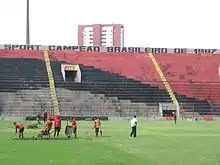
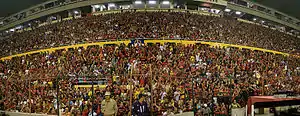
- Avenida Malaquias
Belonged to Sport Recife from 1918 until 1937, here's more details of the first stage red and black, whose wooden bleachers and iron was bought by the Fluminense, 90 years ago. Location; Recife; Capacity; 8,000 people (2000 being seated); Opening: America-PE 3–1 Flamengo on May 15, 1918 Attendance record: 8000 spectators (30s)
- Adelmar da Costa Carvalho Stadium (Ilha do Retiro Stadium)
Better known as Ilha do Retiro, is a stadium for the soccer practice, and official seat of the Sport Club do Recife. Located in the neighborhood of Ilha do Retiro in Recife, capital of Pernambuco State. Recently was considered the best stadium in the Northeast, by its structure, location, and obey FIFA standards. The Ilha do Retiro stadium, inaugurated in 1937, with a maximum capacity of 35,520 people.
Training Center
- CT Presidente José de Andrade Médicis (CT do Leão)
The CT Presidente José de Andrade Medici, also known as CT do Leão, is a sports training center, located in the city of Paulista, belonging to the Sport Club do Recife. Located in the neighborhood of Paratibe, distant about 30 km from Recife. The site, with a total area of 8 hectares (8,000 m²), is used for training and professional team of the basic categories of Sport. The Lion CT is currently undergoing major improvements in the structural part.
The CT do Leão, has 5 fields sizes officers, with the total area 8 hectares (8,000 m²). Date of purchase: April 3, 2007.
Symbols
Motto
It is well defined in the bylaws of the club: § 2 of the 2nd article of the 1st chapter – in the pursuit of social and cultural activities-sports, the Sport Club do Recife seek to develop, maintain and elevate the true spirit crimson-black, under the slogan Pelo Sport Tudo!(For Sport Everything!). The motto will very likely have to rise at a time that coincides with the onset of war cry, to cry because it is part of initiating the same.
Badge
The first coat of Sport had nothing to do with the current one. In one of the first statutes of the club he was well defined: About an anchor, and arm the date May 13, 1905, based on a pair of oars crossed with a mast containing descendants streamers and a croquette, a lifeguard, and in center a football between a cricket and stick a tennis racket, crossed and surmounted by the letters SCR, interlaced monogram and the body, writing Sport Club Recife. Soon, the badge number 1 represented the Sport all sports practiced by the club at the time, from cricket to spearfishing. The coat was too complex, difficult to reproduce and not bore the colors. Then, in 1919 then President Arnaldo Loyo faced a challenge to many at the time was considered madness: get Sport to Belém do Pará to play a series of five friendlies. The club has achieved significant results since the time the Pará football was more developed than the Pernambuco. These were the results: Sport 3–3 Remo-Paysandu Combination (23/03), Sport 3–2 Paraense Team (27/03), Sport 0–1 Paysandu (01/04), Sport 2x1 Remo-Paysandu Combination (03/04) and Sport 0–1 Remo (06/04). And the game of the day was April 3, 1919 which was in dispute a gorgeous French bronze called of the Lion of the North where the sculptures included a Greek archer accompanied by an imposing lion. To the surprise of Pará, the Sport wins Local combined 2–1 and get the trophy. Disappointment for opposing fans was such that a fan invaded the most daring ship where leaders Crimson-Black kept the piece, and damaged its tail with an iron pipe. This inspired the development of a new coat for the sport. So the lion was adopted as the new symbol of the club because it represented all his boldness, courage and spirit of the winner scored since its founding. The art was responsible for the designer Armando Vieira dos Santos which was based on Scottish heraldry arms to prepare the shield.
.png.webp) 1905
1905 Present
Present
Flag
The pavilion's official Sport is well described in its charter: Article 9 of Chapter 2 – The Sport Club do Recife has as official pavilion, a flag rectangular in shape, with seven horizontal stripes parallel of equal width, four black and three embodied alternately the first and last of which in black color. In the top right corner flag, square black, with the heraldic figure of a lion standing and profile in yellow gold, turned to the right of the square, holding a drawing surround the club logo in black stroke. The background of this design is in yellow gold, appearing in its center, the SCR monogram in black letters intertwined. In the lower right corner of the square, the inscription in yellow gold numeral number nineteen hundred and five, the significant year of foundation of the club. The width of the flag is equal to seven tenths of the length thereof, and the side of the square is equal to the sum of the width of three tracks.
With the achievements of the Brazilian Championship 1987, Brazil Cup 2008, and also the Brazilian Championship 1990 – Series B, was adopted unofficially the use of three stars the first black belt. With two gold, two titles that represent the maximum of the Lion of the Island, and silver, which shows the "title of overcoming," won amid many difficulties.
In the official anthem of the Sport Club do Recife, the author Eunitônio Edir Pereira makes a nice quote to the flag:
Eterno símbolo de orgulho
(Eternal symbol of pride)
É o pavilhão
(Is the flag)
De listras pretas e vermelhas,
(Black and red stripes,)
Com o Leão
(With the Lion)
Erguendo, imponente, o imortal escudo
(Lifting, imposing the immortal shield)
Mostrando a gente que o Sport é tudo
(Showing us that the Sport is everything)
Que a vida tem de belo a oferecer
(What beautiful things life has to offer)
Sport, Sport
(Sport, Sport)
Uma razão para viver
(A reason to live)
Anthem
The official anthem of the Sport Club do Recife was written by the author Eunitônio Edir Pereira, who, with great mastery, led the Crimson-Black sentiment, as seen and acknowledged the fans of the sport. The composition brings a lot of quotes to history and to the particularities of the club. They are: the passion and loyalty of the fans, the club's founding on May 13, 1905 by Guilherme de Aquino Fonseca, and also the various athletes who have played for Sport, who over the years have defended O Leão da Ilha (The Lion of the Island).
Com o Sport Eternamente estarei
(Forever I will be with Sport)
Pois rubro-negras são
(For crimson-black are)
As cores que abracei
(The colors that hugged)
E o abraço, de tão forte,
(And the hug was so strong,)
Não tem separação
(Do not have separation)
Pra mim, o meu Sport
(For me, my Sport)
É religião
(is religion)
A vida a gente vive
(The life we live)
Pra vencer
(to win)
Sport, Sport
(Sport, Sport)
Uma razão para viver
(A reason to live)
Treze de Maio,
(Thirteenth of May)
Mil novecentos e cinco
(One thousand nine hundred and five)
Dia divino em que Guilherme de Aquino
(Divine day in which Guilherme de Aquino)
Reúne, no Recife, ardentes seguidores
(Gathers in Recife, ardent followers)
Fundando esta nação de vencedores
(Founding this nation of winners)
Que encanta, enobrece e dá prazer
(What enchants, ennobles and gives pleasure)
Sport, Sport
(Sport, Sport)
Uma razão para viver
(A reason to live)
Eterno símbolo de orgulho
(Eternal symbol of pride)
É o pavilhão
(Is the flag)
De listras pretas e vermelhas,
(Of Black and red stripes,)
Com o Leão
(With the Lion)
Erguendo, imponente, o imortal escudo
(Lifting, imposing, the immortal shield)
Mostrando a gente que o Sport é tudo
(Showing the people that Sport is everything)
Que a vida tem de belo a oferecer
(What beautiful things life has to offer)
Sport, Sport
(Sport, Sport)
Uma razão para viver
(A reason to live)
São gerações e corações
(Generations and hearts are)
Fazendo a história
(Making History)
São campeões e emoções
(They are champions and emotions)
Tecendo a glória
(Weaving the glory)
Do bravo Leão da Ilha, Sport obsessão
(Bravo Lion Island, Sport obsession)
Que faz bater mais forte o coração
(What makes the heart beat faster)
Torcida mais fiel não pode haver
(There can't be a more faithful crowd)
Sport, Sport
(Sport, Sport)
Uma razão para viver
(A reason to live)
Sport! Sport! Sport!
(Sport! Sport! Sport!)
Colors
Article 6 of the 2nd chapter says that: The official colors of Sport Club do Recife will always be black and red, used together, in uniforms, shields, badges, pennants, flags, etc...
Uniforms
The uniforms of Sport are described in Article 8 of the 2nd chapter: In sports competitions, athletes from Sport Club do Recife will wear an official uniform, which will always have the SCR shield on their shirt, on their left side and at chest level, and obeys one of the following uniforms:
a) Shirt with black and red stripes, with white or black shorts and black socks;
b) White shirt, shorts and socks
c) Black shirt, shorts and socks, with red accents;
d) Golden shirt, shorts and socks, with discreet red and black details;
Kit Manufacturers
 Penalty (1973–74)
Penalty (1973–74) Malharia Terres (1977–80)
Malharia Terres (1977–80) FAIXA (1980)
FAIXA (1980) Adidas (1980–82)
Adidas (1980–82) Le Coq Sportif (1983–87)
Le Coq Sportif (1983–87) Everest (1987)
Everest (1987) MR Artigos Esportivos (1988–89)
MR Artigos Esportivos (1988–89) Topper (1988–92)
Topper (1988–92) Finta (1992–94)
Finta (1992–94) Rhumell (1995–98)
Rhumell (1995–98) Topper (1998–08)
Topper (1998–08) Lotto (2008–2013)
Lotto (2008–2013) Adidas (2014–2017)
Adidas (2014–2017) Under Armor (2018)
Under Armor (2018) Umbro (2019–Current)
Umbro (2019–Current)
Kit sponsors
- 1983: AVIS (in some games) and Federal Seguros (in some games)
- 1985–92: Banco Banorte
- 1993–94: Coca-Cola
- 1995–97: Tintas Renner
- 1998: Excelsior Seguros
- 1999: Sonrisal
- 2000: Saúde Excelsior (in the Copa dos Campeões) and Bauducco (in the quarter-finals of the Copa João Havelange)
- 2001: TAM (in some games)
- 2002: Tupan (in the game of Copa do Brasil), TIM and Direct (in the Copa do Nordeste)
- 2003: Hexal Genéricos
- 2004: Lemon Bank and Moura Dubeux
- 2005: Cimento Nassau
- 2006: Cimento Nassau, Rota do Mar and Moura Dubeux
- 2007: Cimento Nassau, Minasgás, Rota do Mar and Moura Dubeux, Frevo, Prefeitura do Recife, Nordeste Segurança (in some games)
- 2008: Cimento Nassau. Minasgás, CNA (in some games) and TOTVS (in the final of the Copa do Brasil)
- 2009: Cimento Nassau, CNA (in some games), Shineray
- 2010: Cimento Nassau, Supergasbras, Shineray, BMG, Mec-tronic, Mycrocred
- 2011: BMG, Supergasbras, Shineray, Mycrocred, Farmácias Guararapes (Finals of the Campeonato Pernambucano), Webmotors.
- 2012: MRV Engenharia, EletroShopping, Tintas Iquine, Shineray, Brasilit.
- 2013: Eletroshopping, Shineray, BioGarnier (games in the second stage of the Campeonato Pernambucano), BMG and Mycrocred (in the second game of the finals of the Campeonato Pernambucano).
- 2014: Caixa Econômica Federal
- 2020: Gazin, Zaeli, Foxlux, Excelsior Seguros, JBS Veículos, Minha Casa Financiada and GAV Resorts
Mascots
In 1919 in Para, they won the Lion of the North Trophy competition, which at the time was considered very difficult for any team from Pernambuco, as football in Para was more developed. Sport then went to Belem and won the French bronze trophy, which would later be the reason for creating the mascot, the lion, as well as the creation of one of the nicknames of Sport: Leão do Norte (Lion of the North).
The mascot symbol of Sport called Leo. It was created over 25 years ago by cartoonist Humberto Araujo, and since then has been illustrating the achievements and highlights of the club. Leo is beloved among all the fans of the Crimson-Black, especially by children. The name Leo means lion in Latin.
War cry
Source Cazá, Cazá
The first time the battle cry of Sport was hailed back to the Championship celebrations Pernambucano 1938, the year in which the Lion won another title. Vasco da Gama has a war cry similar to the Sport, with some minor changes in some verses. There it began to be hailed by 1942, by which time the legendary Ademir Menezes, greatest player in the history of Pernambucan football and one of the best in the history of world football, began playing there, with the cry of the Vasco players. Despite more than six decades ago, Cazá, Cazá never lost its vitality and originality, and it became theme music for many composers and constituted one of the trademarks of Crimson-Black crowd wherever it went. Currently, the battle cry is sung at the beginning of each game time in Ilha do Retiro, pulled by Rádio Ilha, besides the crowd during games.
Caza, Caza
Pelo Sport nada?
(For Sport nothing?)
Tudo!
(Everything!)
Pelo Sport nada?
(For Sport nothing?)
Tudo!
(Everything!)
Então como é, como vai ser e para sempre será?
(So how is it, how will it be and how will it always be?)
Cazá! Cazá! Cazá, Cazá, Cazá!
(Caza! Caza! Caza, Caza, Caza!)
A turma é mesmo boa!
(The class is really good!)
É mesmo da fuzarca!
(It's the same fuzarca!)
Sport! Sport! Sport!
(Sport! Sport! Sport!)
Supporters Day
In 2008, Sport Supporter Day was founded, through the Law No. 17.415/2008, and bill No. 249/2005. The commemorative date coincides with the date of the founding of the club.
Publications about Sport
- Books
- SILVESTRE, Rafael. Copa do Brasil 2008 – Há cinco anos o Brasil era rubro-negro. BB Editora, São Paulo, 2013.
- FILHO, Costa. Meu Coração de Leão – Memórias de um Paraibano Louco pelo Sport. Mídia Gráfica e Editora, João Pessoa, 2013.
- BIVAR, Fernando Caldas. Coração Rubro-negro: "A união faz o Leão". Independente, Recife, 2005.
- CORDEIRO, Carlos Celso e; GUEDES, Luciano. Sport – Retrospecto – 1905 a 1959. Recife, 2005.
- CORDEIRO, Carlos Celso e; GUEDES, Luciano. Sport – Retrospecto – 1960 a 1979. Recife, 2006.
- CORDEIRO, Carlos Celso e; GUEDES, Luciano. Sport – Retrospecto – 1980 a 1999. Recife, 2007.
- SANTOS, Manoel Heleno Rodrigues dos. Memória Rubro-negra (1905–55). M. Inojosa Editora, Recife, 1985.
- SANTOS, Manoel Heleno Rodrigues dos. Memória Rubro-negra II (1956–88). Editora Universitária da UFPE, Recife, 1992.
- SOUZA, Carlos Enrique de. Histórias da Garra Rubro-negra. Editora Comunicarte, Recife, 1993.
References
- Brígido, Carolina (April 18, 2017). "STF declara Sport campeão brasileiro de 1987" [STF declare Sport 1987 Brazilian champion]. O Globo (in Portuguese). Retrieved January 3, 2018.
- FIFA.com (May 27, 2020). "The grand old foes of Recife". www.fifa.com. Retrieved May 27, 2020.